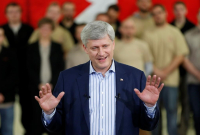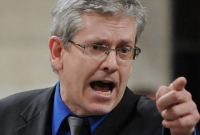Sun Media Parliamentary Bureau Chief David Akin says Stephen Harper’s Conservative government cheats its way to power year after year.
Akin posted a diatribe about the Harper government’s record of cheating on a thread on his Facebook page. The post went viral.

In the post, Akin pointed out that the Harper administration is unique in Canadian history, in that senators appointed by a sitting prime minister—one seeking re-election— are facing or will face criminal charges.
Akin wrote that for the first time in 60 years, an individual was jailed for crimes committed while sitting as an MP. The reference was to Dean Del Mastro, the Peterborough Conservative MP, who received a month in jail for overspending on his 2008 election campaign.
Michael Sona, a former Tory staffer, was sentenced to nine months in jail in 2014 for his role in the robocall scandal in Guelph, Ontario.
Akin noted that the Conservative Party admitted to breaking the law in 2006 and paid a large fine for doing so. That incident was the so-called in-and-out scandal in which the party exceeded national campaign spending limits by moving funds through local ridings.
Harper himself cheated in 2008 when he broke his own fixed-date election law, Akin also wrote.
“So: for an independent like me, the party most likely to cheat, break the law, etc. for its own advantage is the one in power,” Akin wrote. “It did so in 2006, 2008, 2011 – every election in which it won the government.”
Akin told the National Observer that the post was a reply to Conservative partisans. He explained that whenever the media write about the Duffy trial or other scandals the Harper government and the Conservatives have found themselves in, Tory partisans weigh in about the Liberal sponsorship scandal or accusations regarding the NDP’s fund misspending.
“The point of this particular post you’re speaking about is to say, hold on a second, Conservative partisans. There’s never been a New Democrat who had a police investigation. There’s never been a NDP MP who spent a night in jail as Dean Del Mastro did, and so on.”
By the same token, Akin pointed out that in late August, a Liberal candidate for the riding of Mississauga-Lakeshore, Sven Spengemann, admitted to breaking election spending laws and only had to sign a compliance agreement with Elections Canada.
“That doesn’t seem very fair to me,” Akin said. “One guy [Dean Del Mastro] goes to jail; the other guy gets a little slap on the wrist.”
Regardless of who is breaking the law, the ethics and morals of politicians seem to hold little sway with the voting public, who tend to be more concerned about the economy.
For voters, the economy absolutely trumps morals and ethics in government, said Lydia Miljan, an associate professor of political science and director of the Bachelor of Arts and Sciences Program at the University of Windsor.
She noted the economy as an election issue is particularly important when the dollar is dropping significantly and with the current run on commodities in the markets. “People are going to be very much in tune with economic issues.”
Miljan said voters do care about ethics and morals, but it’s not the top issue for them. However, over time, government scandals can tarnish political brands, leading to a breaking point where the voters revolt.
Akin said that as a member of the Ottawa press gallery, he’s been pointing out moral and ethical failings of the Harper government since 2008. “Voters, I can tell you, from letters to the editor, they don’t care.”
He said the readers tell him: “’There are more important things. Go find some real news.’ They don’t seem to care.”
But Akin said that won’t deter him from reporting on the government’s follies. “We’ve been pointing them out. We’ll continue to point them out.”





Comments